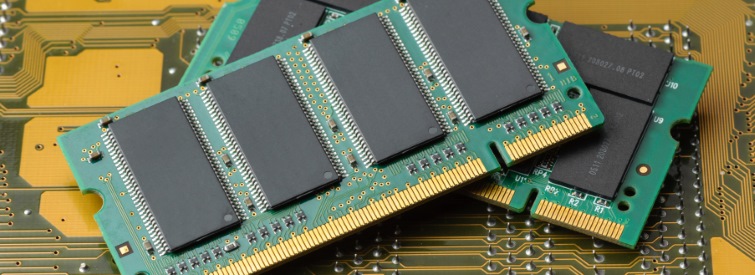
System memory also known as RAM (Random-access memory) is where computer programs store their data for immediate delivery to the processor. For laptops, RAM memory uses a compact form factor referred to as SO-DIMM.
Characteristics
System memory (RAM) is characterized by capacity and speed. Memory capacity in measured in megabyte (MB) or gigabytes (GB) where 1 GB = 1024 MB. Memory speed is measured in megahertz (Mhz).
For laptops and PCs, memory capacity is more important than speed because if programs use up all the memory, then the laptop will become slow and unresponsive. Memory speed has a small impact on system performance and is only noticeable when doing memory intensive tasks, like video processing.
Capacity
Almost all laptops today come with at least 4GB of RAM memory. The operating system usually needs around 1-2 GB of RAM with the rest available for other programs. Given today’s browser memory usage which can be up to 1-2 GB of RAM and that users simultaneously open other programs, like Skype or Office, then 4GB is the minimum necessary for decent laptop usage.
Of course, if the laptop will be used for more intensive tasks, like gaming, image editing or virtual machines, then it is recommended to get at least 8GB of system memory or more.
CAS Latency
Besides the usual memory speed measured in megahertz, there is another indicator for memory speed called CAS Latency or in short CL. This measures how fast information is retrieved from a memory module. Almost all laptop memories will have the same CAS Latency at the same speed. However, it is possible to have memories with smaller CAS latencies than the standard. These are a bit faster. Such is the case of special branded memories like Kingston HyperX, G.Skill Ripjaws or Corsair Vengeance. To compare memories with different speeds and different CL, the memory with the smallest ratio between CAS Latency and speed is the fastest.
*Ex. 2800MHz at CL13 (13/2800=0.0046) is better than 3000Mhz at CL15 (15/3000 = 0.005)

ECC
Although rare, sometimes memories have an ECC or non-ECC specification. ECC means the memory supports error correction, this is used mostly in servers. All consumer RAM memory is non-ECC.

Leave a Reply